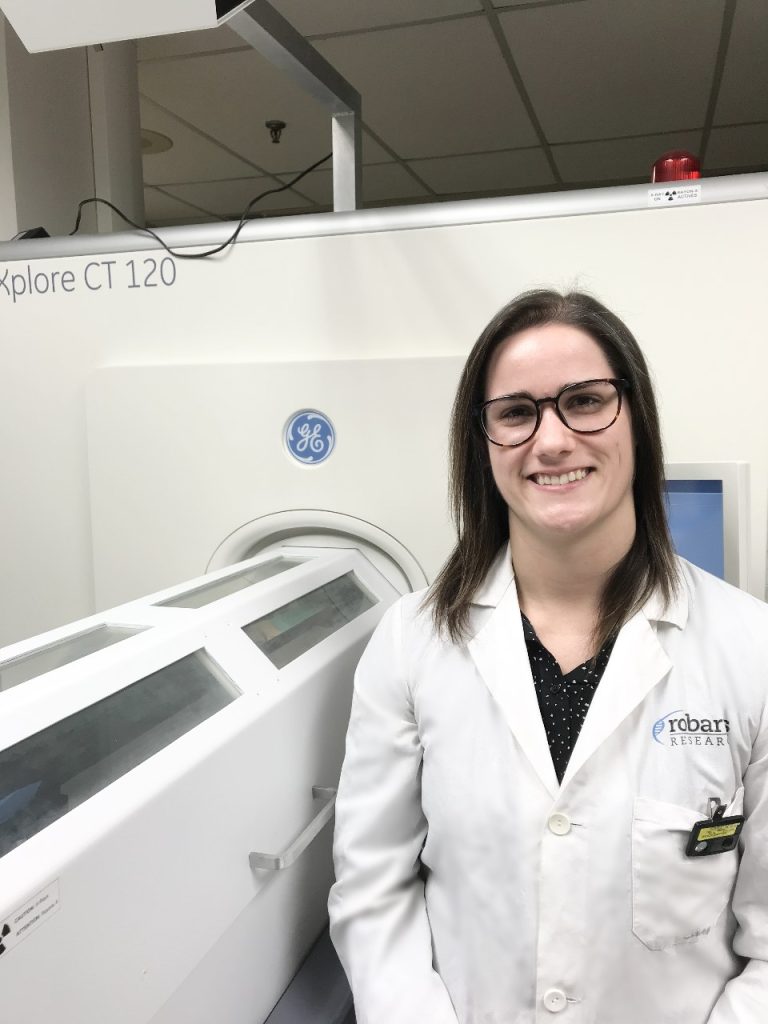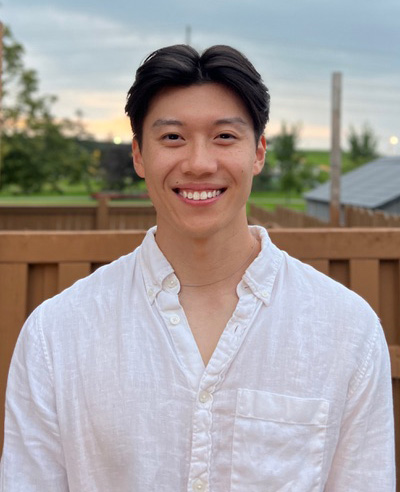- Please tell us a little bit about yourself.
I am a Ph.D. candidate in the Department of Medical Biophysics at the University of Western Ontario, working under the supervision of Dr. Eugene Wong and Dr. Jeff Chen. I hold a BSc with honours specialization in Biomedical Physics from Laurentian University and a CAMPEP accredited MSc in Medical Physics from the University of Manitoba. I grew up in Northern Ontario, in a small mining town called Red Lake and hope to one day work in Northern Ontario as a Medical Physicist in a Cancer Centre.
- Why are you passionate about the work you are doing, and/or do you have a personal connection to breast cancer?
As a graduate student doing research on breast cancer, I’m passionate about contributing knowledge to the field of breast cancer treatment that can impact patient care and quality of life. Multiple family members and friends’ lives have been changed by breast cancer and I want to be able to find new ways to improve the treatment they receive and help support them in their fight against breast cancer.
- Why is the TBCRU Studentship Award important to you, and how does it advance your research?
Being a recipient of the TBCRU Studentship Award is an incredible honour and it connects me with other trainees and researchers all with one common goal, researching breast cancer. The award not only provides a scholarship for me to perform experiments that advance our knowledge about breast cancer treatments, but helps me motivate and communicate my research.
- In a few lines, please describe your research project, including the main objective and what problem(s) you hope to solve.
Breast cancer is a devastating disease when it spreads to and grows in the brain. This is common and is exceedingly challenging to treat. The standard radiation treatment for breast cancer growing in the brain is to target the growing tumours. However, within one year, half of the patients will have new tumours growing again in other parts of the brain. Previously whole brain radiation was used to kill the undetectable cancer cells in the brain. It proved effective, however is not currently used because it has significant side effects.
My research aims to find a different whole brain radiation dose and treatment schedule that controls the cancer with reduced side effects. We are assessing this novel brain imaging approach in animal models to monitor the inflammation responses of the brain and cancer following treatment. If this proves to be effective, then this can be translated to the clinic to combat the problem of breast cancers that spread to the brain.
- Have there been any changes to or any advancements in your research since your project began?
From my initial imaging experiments, I have found some interesting interactions between radiation and inflammation in the brain, including the observation that there was a noticeable change in the imaging for different dose levels. The period and location of the immune cells in the brain following different amounts of radiation is being further explored, as well as determining the corresponding effects of the radiation doses on the breast cancer cells.
- Have you had an opportunity to present (or publish) your research to your peers or the broader research community? Was it at a national or international meeting or in some other way?
I have published a review paper investigating the potential of glial activation imaging (used in my research) in radiation treatment of breast cancer brain metastases. Additionally, last summer I was selected as a MedPhys Slam Finalist for the International chapter and presented my research at the American Association of Physicists in Medicine (AAPM) Annual Meeting in the form of a 3-minute oral presentation.
- If you received feedback following your presentation how has it helped you and your research?
I find questions and feedback following a presentation to be very helpful. They often provide me with more information on potential research methods and ideas to investigate; making me think about the bigger picture and impact of my breast cancer research.
- How will your research be applied in the clinic or in a real-world setting? How will patients benefit from the results of your work?
Following the completion of our preclinical animal studies, we hope to employ our novel imaging approach and preclinical data to a dose-finding clinical trial for breast cancer patients.
- Tell us about your involvement in the Breast Cancer Canada fundraising events (Raise More Challenge, One Billion Steps Challenge).
I have been an avid participant in the different fundraising events held by BCC over the years. I love working together with the other trainees and researchers to raise funds for an amazing organization. This year I participated in the Raise More Challenge in October as well as 2023 Move-A-Thon/Walk-A-Thon for Mother’s Day.
- What are your hobbies? What are you currently reading, watching or listening to outside of the lab?
Outside of the lab, I enjoy outdoor activities and being active through hiking, camping, biking. I am an avid book reader and am currently enjoying the Stormlight Archive series by Brandon Sanderson.




